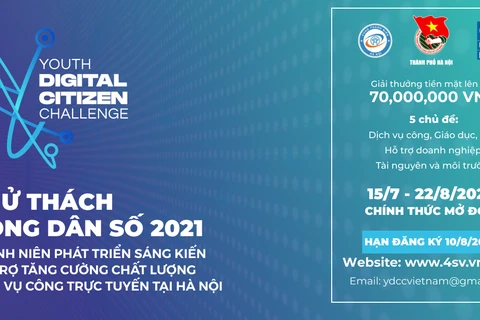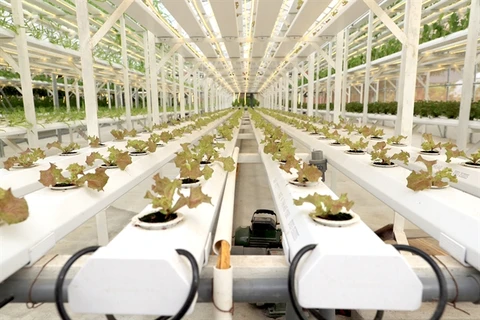 Hanoi promotes using QR codes for farm produce to help consumers quickly trace the origin of the products. (Photo courtesy of Hanoi Agriculture and Rural Development Department)
Hanoi promotes using QR codes for farm produce to help consumers quickly trace the origin of the products. (Photo courtesy of Hanoi Agriculture and Rural Development Department) Director of the Hanoi Agricultural, Forestry and Fisheries Quality Management Sub-Department Nguyen Thi Thu Hang said that at present, Hanoi's agro-food product traceability system had improved transparency in information for about 653 businesses with almost 11,000 sets of traceability codes for agricultural, forestry and fishery products.
"Businesses and cooperatives using QR codes have helped them and consumers to prevent unknown-origin foods on the domestic market," Hang said.
"Labelled agricultural products under safe production chains are sold at 10 to 30 percent higher prices than traditional products."
IT application in production and consumption has also gradually improved the capacity of cooperatives and enterprises in terms of production and supply of products, according to Hang. Consumers can use smartphones to access the date, month of manufacture, expiry date and origin of goods.
Hoang Van Tham, director of the Chuc Son Organic Vegetable Cooperative in Chuong My district, said at present, the connection and consumption of the cooperative's products are made synchronously with modern sales channels such as supermarkets and e-commerce trading floors.
The stamping of traceability has helped the cooperative stabilise the consumption of vegetable products on the market. The cooperative has supplied 3 tonnes of vegetables daily to many supermarket systems such as Big C and T-mart, large hospitals, and schools. It has gained 11 billion VND per year.
Dang Thi Cuoi, director of the Cuoi Quy Organic Vegetable Production Cooperative in Dan Phuong district, said that all vegetable products of the cooperative have QR codes to trace their origin.
This cooperative supplies vegetables to kindergartens in Dan Phuong district and the chain of Bac Tom clean food stores, and six wholesale markets in the region.
To promote the application of QR codes in the production and trading of farm produce, Dam Van Dua, director of the Dong Cao General Service Cooperative in Me Linh district, said that Hanoi's departments and sectors should continue to support cooperatives in applying IT in production and upload information about the origin of farm produce at the capital city's traceability websites.
At the same time, Hanoi authorities also need to implement a connection in the consumption of agricultural products between the enterprises and modern sales channels, Dua said. Meanwhile, the cooperatives themselves will continue to manage the daily production diary of farmers closely and then upload the information to the traceability management systems.
Vice-chairman of the Thanh Oai District People's Committee Nguyen Trong Khien said that Thanh Oai district has strengthened strict food safety management and promoted the application of QR codes to trace products.
It has also provided training courses for all production facilities in the district to deploy a traceability system for agricultural products and goods. This district has also supported the cooperatives in participating in fairs to enhance the consumption of farming products.
Deputy director of Hanoi Department of Agriculture and Rural Development Nguyen Ngoc Son said Hanoi has targeted to build 50 production chains for critical agricultural products by 2050.
Those chains will have concentrated cultivation regions and apply IT and QR codes in the production and consumption of agricultural products to promote traceability for those products.
In addition, to make information transparent, Hanoi will encourage and support cooperatives of producing, processing and trading agricultural, forestry and seafood products by implementing traceability and trading activities on e-commerce platforms business. They will improve the competitiveness of businesses and enhance the distribution of goods.
Hanoi's agriculture sector determined that promoting digitalisation is essential and called for the building of an electronic sales channel.
It has recently supported 12 cooperatives and production facilities to access the e-commerce platform Postmart of Vietnam Post Corporation.
Deputy director of Hanoi Post Office Bui Van Hoang said to support trade promotion activities in the Hanoi agricultural sector, Hanoi Post Office will coordinate with relevant offices to review and put agricultural products on the e-commerce trading floor Postmart, connecting consumption of agricultural products at Postmart and the point of sale system.
At the same time, it will coordinate with them to build data on high-quality agricultural products and goods.
According to director of the Hanoi Department of Agriculture and Rural Development Chu Phu My, to renew trade promotion activities, Hanoi's agriculture sector will focus on developing online trade promotion channels and promoting digital transformation.
Specifically, it will organise trade promotion activities and expand consumption markets for essential farm produce and products under the One Commune One Product (OCOP) programme.
It will also diversify methods of advertising activities and develop a chain of stores for OCOP products and local key products on e-commerce platforms and tourist destinations in the city.
The agriculture sector will develop a data system for growing areas, processing and kinds of agricultural products to create favourable conditions for putting such products on the e-commerce platform./.
VNA























